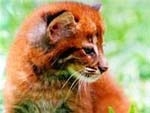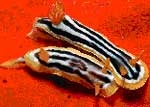From animated films to fables, one of the most common images we encounter is that of an elephant cowering and appearing very frightened in front of a mouse.
Mice are rodents capable of rapid reproduction. Despite their small size, these animals can damage crops, gnaw on furniture, and cause unpleasant odors in living spaces.
Mice typically inhabit damp, dark places, often carrying numerous harmful viruses and bacteria. Among them, the plague caused by Yersinia pestis from rats has claimed the lives of tens of millions of people. For these reasons, most people dislike and even fear mice, leading to a psychological syndrome known as Musophobia that many individuals suffer from. Many believe that elephants share this fear.
It is unclear where and when the myth of “elephants fearing mice” originated. However, many scholars worldwide suggest that it may have originated around 77 AD, during the time of Pliny the Elder and later Aristotle – perhaps the most influential scholar of antiquity.
Pliny was the first to state that “elephants fear mice more than any other creatures”, and because he was highly influential and respected, this belief not only spread among the Romans but also across other regions for many millennia thereafter.
However, there is a fact that elephants do not naturally inhabit Western environments, so like many strange animals to the ancient West, the appearance and behavior of elephants were entirely dependent on the imagination of Westerners at that time.
Accordingly, there were a few individuals genuinely fascinated by the image of a several-ton animal cowering in fear before a tiny mouse, such as Allen Moulin, a doctor in the 1600s.
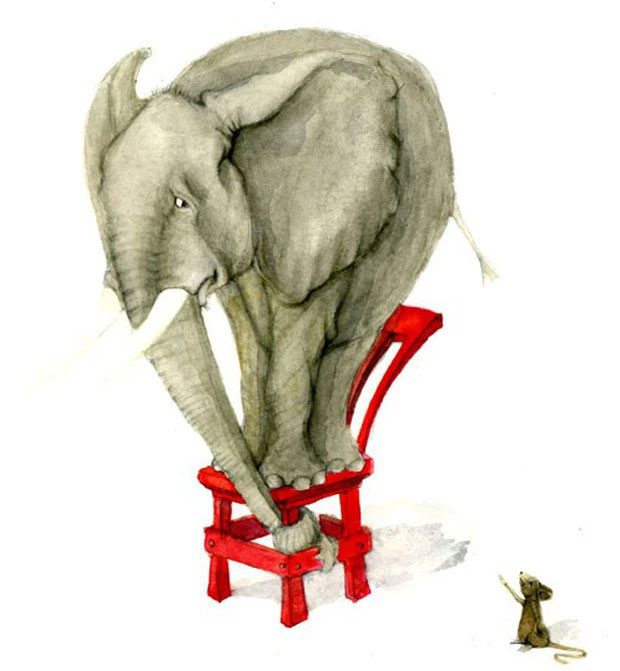
It is often said that elephants are very afraid of mice – at least that’s what folklore in many different cultures suggests. Furthermore, it is believed that elephants are very afraid of mice because mice can crawl into an elephant’s trunk, causing great discomfort, even suffocation and death.
Moulin, with limited knowledge of elephant anatomy, argued that since elephants do not have a laryngeal flap – the cartilage that protects the trachea while swallowing – it is reasonable to speculate that such a large creature could be frightened by a small mouse if it could crawl up the trunk and potentially cause the elephant to suffocate.
However, this claim lacks clear scientific backing. Modern biologists assert that elephants do have soft cartilage to protect their tracheas. Even if a mouse, insect, or any “debris” were to enter their trunks, elephants can easily blow them out.
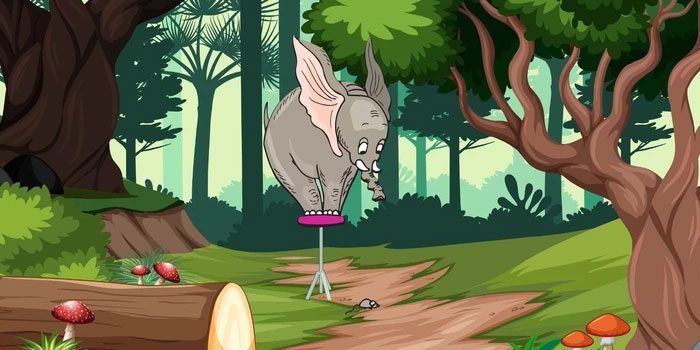
Science has confirmed this, though the situation is a bit different. In reality, elephants are not necessarily afraid; they are simply startled because mice appear suddenly and move too quickly. Experiments on elephants show that they exhibit similar reactions to cats or dogs, and even snakes.
However, in an episode of Myth Busters – a popular American science entertainment show, Adam Savage and Jamie Hyneman discovered that the myth is indeed based on reality. Although they could not conclude why this occurs, their experiments indicated that South African elephants would “freeze in place” when encountering mice – upon noticing the presence of mice, they would actually back away and even begin to move in the opposite direction.
According to John Hutchinson, a researcher at the Royal Veterinary College in London, elephants in the wild appear to be very anxious whenever they detect signs of small, agile creatures. This means that not only mice can scare them, but also dogs, cats, and any small, quick animals can make elephants feel uneasy. Additionally, there is a novel factor involved.
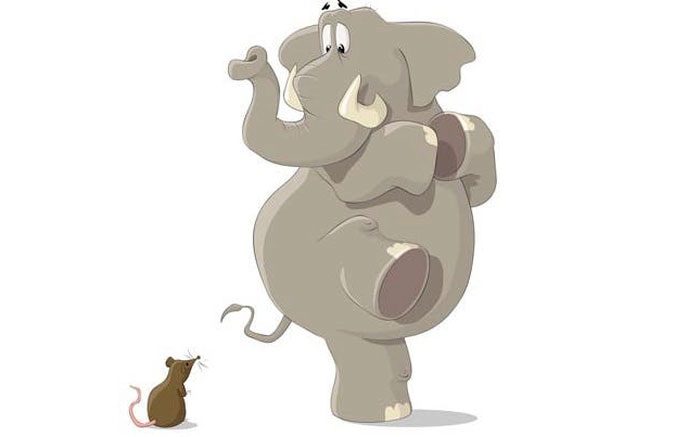
Rather than fearing mice, elephants seem to simply get startled by their quick movements.
Captive elephants, such as those in zoos or circuses, are often seen sleeping with rodents right above them. These elephants appear to be largely unconcerned about the mice. Therefore, rather than fearing mice, elephants seem to simply get startled by their quick movements. And, indeed, the same could likely happen with any animal living in the wild.
Moreover, in studies conducted by the Elephant Protection Group in Kenya, they found that elephants are very afraid of bees.
Lucy King, a leading zoologist in the study conducted by the Elephant Protection Group in Kenya, stated that elephants are very afraid of bees because whenever they hear the buzzing sound, they will immediately run away.
By experimenting with the sound of buzzing bees, they found that the herd would stop, try to locate the sound’s source, and then the matriarch would instruct the entire herd to retreat.
She and the research team hope that this method will help them drive away elephants that threaten Kenyan crops while also reducing the killing of elephants by locals to protect their harvests.








































